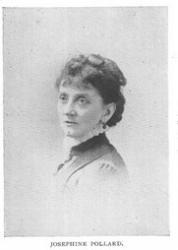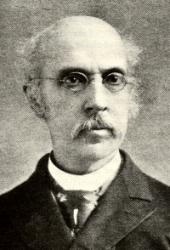Planning worship?
Check out our sister site, ZeteoSearch.org,
for 20+ additional resources related to your search.
- |
User Links
Person Results
W. Howard Doane

1832 - 1915 Person Name: W. H. Doane Composer of "[We must work and pray together]" in The Bright Array An industrialist and philanthropist, William H. Doane (b. Preston, CT, 1832; d. South Orange, NJ, 1915), was also a staunch supporter of evangelistic campaigns and a prolific writer of hymn tunes. He was head of a large woodworking machinery plant in Cincinnati and a civic leader in that city. He showed his devotion to the church by supporting the work of the evangelistic team of Dwight L. Moody and Ira D. Sankey and by endowing Moody Bible Institute in Chicago and Denison University in Granville, Ohio. An amateur composer, Doane wrote over twenty-two hundred hymn and gospel song tunes, and he edited over forty songbooks.
Bert Polman
============
Doane, William Howard, p. 304, he was born Feb. 3, 1832. His first Sunday School hymn-book was Sabbath Gems published in 1861. He has composed about 1000 tunes, songs, anthems, &c. He has written but few hymns. Of these "No one knows but Jesus," "Precious Saviour, dearest Friend," and "Saviour, like a bird to Thee," are noted in Burrage's Baptist Hymn Writers. 1888, p. 557.
--John Julian, Dictionary of Hymnology, Appendix, Part II (1907)
===================
Doane, W. H. (William Howard), born in Preston, Connecticut, 1831, and educated for the musical profession by eminent American and German masters. He has had for years the superintendence of a large Baptist Sunday School in Cincinnati, Ohio, where he resides. Although not a hymnwriter, the wonderful success which has attended his musical setting of numerous American hymns, and the number of his musical editions of hymnbooks for Sunday Schools and evangelistic purposes, bring him within the sphere of hymnological literature. Amongst his collections we have:—
(1) Silver Spray, 1868; (2) Pure Gold, 1877; (3) Royal Diadem, 1873; (4) Welcome Tidings, 1877; (5) Brightest and Best, 1875; (6) Fountain of Song; (7) Songs of Devotion, 1870; (8) Temple Anthems, &c.
His most popular melodies include "Near the Cross," "Safe in the Arms of Jesus," "Pass me Not," "More Love to Thee," "Rescue the Perishing," "Tell me the Old, Old Story," &c.
- John Julian, Dictionary of Hymnology (1907)
W. Howard Doane
Josephine Pollard

1834 - 1892 Person Name: Josepine Pollard Author of "We’ll Help the Cause Along" in The Bright Array Josephine Pollard USA 1834-1892. Born at NYC, NY, one of seven children and daughter of an architect, she attended an exclusive girls school, Spingler Institute, and was a lifelong member of the Presbyterian Church. She was a founding member of the professional women’s club, Sorosis. She never married. She became an author, poet, and hymnist, writing many children’s books and for children’s magazines, including Harper’s, Scribner’s, and the New York Ledger. She wrote 44 books, mostly religious, for children, but also about history, birds, sports and games, and adventure stories. She also wrote 100+ hymn lyrics as well. She worked as an editor for the Sunday School Times and for the Methodist Book Concern, where she edited a magazine for African Americans. Her children’s books include: “History of the U.S.” (1884); “The life of George Washington” ; “The life of Christ for young people”; “History of the New Testament in words of one syllable” (1899); “History of the Old Testament in words of one syllable” (1899); “Bible stories for children” (1899). She was in poor health in her latter years. She died at NYC, NY.
John Perry
===============
Pollard, Josephine, born in New York, circa 1840, is the author of (1) "I stood outside the gate" (Lent), (2) "Joy-bells ringing, Children singing" (Joy) in I. D. Sankey's Sacred Songs and Solos, 1878.
--John Julian, Dictionary of Hymnology, Appendix, Part II (1907)
Josephine Pollard
Henry S. Perkins

1833 - 1914 Person Name: H. S. Perkins Composer of "[We must work and pray together]" in Gospel Bells Henry Southwick Perkins USA 1833-1914. Born at Stockbridge, VT, the son of musical parents (both singers) he was trained musically, primarly by his father. He attended some of the best literary schools in his youth. His formal music education began in 1857, when he entered the Boston Music School, graduating in 1861. For over 20 years he devoted considerable time to conducting music festivals and conventions throughout America, from ME to CA. He also taught music in NY, OH, IN, WI, IA, CO, KS, and TX. He served as Professor of Music at the University of IA (1867-69), principal of the IA Academy of Music, Iowa City, IA, for five years, and principal at the KS Normal Music School for five consecutive summers. He composed vocal music for choirs, Sunday school, public schools, choir societies, conventions and festivals. He helped organize the Music Teachers’ National Association in 1876, serving in most capacities there between (1887-1897). He also organized the IL Music Teachers Association in 1886, serving as its president for 10 years. He settled in Chicago in 1872 and was a noted music critic for the papers there. In 1891 he established the Chicago National College of Music. He published several hymn books, including: “The nightingale” (1860), “The church bell” (1867), “The song echo” (1971), “The sunny side” (1875), “The shining river” (1875), and “Gospel bells” (1883). He died at Chicago, IL.
John Perry
Henry S. Perkins


 My Starred Hymns
My Starred Hymns

